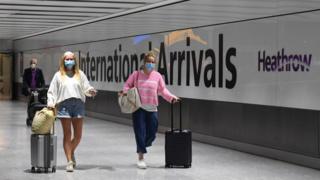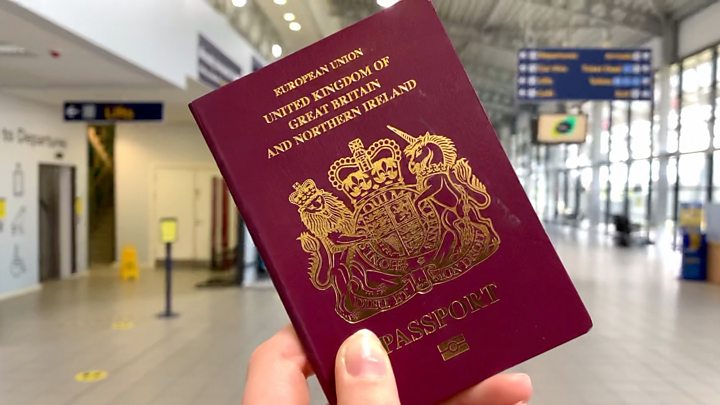 Image copyright
Kirsty O'Connor/PA Media
Image caption
Travellers arrive at Heathrow Airport after a flight from Dubrovnik, Croatia, landed
Image copyright
Kirsty O'Connor/PA Media
Image caption
Travellers arrive at Heathrow Airport after a flight from Dubrovnik, Croatia, landed
Travellers returning to the UK from Croatia, Austria and Trinidad and Tobago must quarantine for 14 days as new coronavirus travel rules kick in.
Some UK tourists raced to beat Saturday's 04:00 quarantine deadline, enduring long drives and spending thousands of pounds on new flights.
Children in families who did not return in time will miss the start of school in England, Wales and Northern Ireland.
But searches for flights to Portugal rose as it was put on the safe list.
Meanwhile, extra restrictions to stem the spread of Covid-19 have come into force in north-west England.
The quarantine measures for Croatia, Austria and Trinidad and Tobago have been imposed because of a spike in coronavirus cases in those countries, the UK government has said.
As of 21 August, the UK recorded 21.2 coronavirus cases per 100,000 people over the last fortnight, according to the European Centre for Disease Prevention and Control.
In comparison, Croatia had 47.2 cases per 100,000, Austria had 33.0 and Portugal 28.5.
There are currently 17,000 British tourists in Croatia, according to the country's national tourist board.
On Friday evening, British Airways flights arriving from the Croatian city of Dubrovnik and the capital Zagreb at London's Heathrow airport were among the last to reach the UK before the deadline.
Image copyright Reuters Image caption People wait for planes at Croatia's Split airport on Thursday'We needed more warning'
Adam and Katie Marlow, from Buckinghamshire, drove three hours from the coastal city of Zadar to Zagreb to get a new flight home instead of returning on Saturday.
The couple chose to return early due to Mrs Marlow's pregnancy and her need to return to her job as a sales manager on Monday. They said their new flights cost about £300, while the car hire was another £100.
Mrs Marlow, 33, who is due to give birth in October, said she understood why the government had taken the decision, but said it would have been better to have had "a bit more warning" as they had only had 24 hours' notice.
Another Friday, another country in Europe where hundreds of British tourists have frantically had to figure out ways to head home early.
The airline authorities here in Split put on two extra flights on Friday to cope with the sudden demand.
There were at least 500 passengers on board both aircraft. All were British travellers who booked last minute.
"It beggars belief. Why was there such short notice for us to leave?" Karen, an English teacher, tells me. She'd just begun a week in Split and was in the middle of booking a ferry to Italy to get out of the country by the evening, because she said the UK flights had sold out.
In the beautiful medieval town of Sibernik, a group of eight friends from Nottingham Trent University had given up efforts to get back early. Instead they drank beers in a harbour side cafe.
Lou, 20, says: "We tried to get something, but everything was too expensive."
Her friend Amber added: "It's upsetting because we planned this trip carefully, and quarantine means we can't go back to part-time work for two weeks, which sucks because it helped towards my university studies."
The last flight here left just after 21:00 on Friday from Split airport.
Emma from Bristol, one of the last passengers to leave on Friday night, told me by phone that "it's a fair point that some people might not feel sorry for us, that maybe we should've known that quarantine was possible, by now".
She added: "I wanted to take a risk, and avoid the populated beaches back home, to come to quieter places.
"I reckon it was worth it even if I'm sweaty and out of breath just to get back home."
'I wish we'd stayed at home'
Another traveller, Cristiano Torti, 41, paid about £1,500 to fly his wife and two children back to the UK six days earlier than planned.
He said they had lost about £500 of the original return flight bookings, but it would have been "very difficult" to quarantine with his young children as he and his wife both work from home.

Media playback is unsupported on your device
Mr Torti, a developer from Oxfordshire, said that his eldest child would have missed some of the new school term had the family not returned in time.
"We've lost a lot of of money, between the accommodation, the flights, and the knock-on effects: the car hire, the airport parking. I kind of wish we'd stayed home, despite the miserable British weather," he said.
Meanwhile, Google search data showed a significant rise in searches for the term "flights to Portugal" by UK users at about 18:00 BST on Thursday; with a smaller spike at 07:00 BST on Friday morning.

Media playback is unsupported on your device
Several EasyJet flights from London airports to Portugal were listed as unavailable for Saturday and Sunday, while airlines such as Jet2 laid on extra seats to Faro from Monday across the UK.
Travel expert Simon Calder tweeted that the cost of flights from Manchester to Faro on Saturday morning had risen from £50 to £98 in 30 minutes.
People who do not self-isolate when required can be fined up to £1,000 in England, Wales, and Northern Ireland. In Scotland the fine is £480, and up to £5,000 for persistent offenders.
The UK introduced the compulsory 14-day quarantine for arrivals from overseas in early June.
But the following month, the four UK nations unveiled lists of "travel corridors", detailing countries that were exempt from the rule.
Since then it has periodically updated that list, adding and removing countries based on their coronavirus infection rates and how they compare with the UK's.
Have you been affected by the new quarantine measures? Share your experiences by emailing haveyoursay@bbc.co.uk.
Please include a contact number if you are willing to speak to a BBC journalist. You can also get in touch in the following ways:

 5 years ago
566
5 years ago
566 

